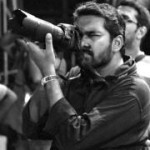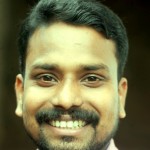 Vinitha Mohan
Vinitha Mohan
Narendra Dabholkar the activist, who spearheaded the anti-superstition movement in Maharashtra and pressed for an enactment of law to ban black magic and inhuman practices, was shot dead by two motorcycle-borne unidentified assailants recently, at Pune, when he was out for a morning walk on the Omkareshwar Temple bridge in the city. Four shots were fired at him from close range by the attackers believed to be in the age group of 25-30 years.
![]() The news spread panic in the mind as the country celebrates the 150th birth anniversary of Swami Vivekananda, the socialist, humanist neo-vedantin, who held that religion is a question of being and becoming, not of believing, and also the106th birth anniversary of Bhagat Singh, the great revolutionary socialist who exhorted the nation to rely on one’s rational mind and intellect to find integrity and harmony rather than blind irrational beliefs. The strange social phenomenon of national heroes getting usurped by groups harbouring communal thinking is cause for concern.
The news spread panic in the mind as the country celebrates the 150th birth anniversary of Swami Vivekananda, the socialist, humanist neo-vedantin, who held that religion is a question of being and becoming, not of believing, and also the106th birth anniversary of Bhagat Singh, the great revolutionary socialist who exhorted the nation to rely on one’s rational mind and intellect to find integrity and harmony rather than blind irrational beliefs. The strange social phenomenon of national heroes getting usurped by groups harbouring communal thinking is cause for concern.
![]() The linguistic animal has the edge over its fellow creatures in all kinds of ways. It can be sardonic, torture children, stockpile nuclear weapons, shame and tame the weaker sections, and exterminate those who hold beliefs contrary to theirs. The assailants of Narendra Dabholkar, the rationalist social activist who fought with uncompromising determination to eradicate superstition are still at large. We talk high of our ancient Indian culture while every twenty minutes passes with the rape of an Indian woman. We quote our great sages and leaders while lives are lost in the name of caste and religion. We worship baby Krishna enthralled by the stories of him while stories of abused children stream out through the media numbing the conscience of the right thinking citizens. Are we falling back to those glorious all perfect past which is told to us when faced with stark realities of the present? What are the hurdles in front of us to practice those high ideals and elevating philosophies to bring back that by gone era of Dharma? Centuries of colonial domination of the mind and body has made us to invent lies and deceptive thinking to wriggle of the present day dilemmas of our society.
The linguistic animal has the edge over its fellow creatures in all kinds of ways. It can be sardonic, torture children, stockpile nuclear weapons, shame and tame the weaker sections, and exterminate those who hold beliefs contrary to theirs. The assailants of Narendra Dabholkar, the rationalist social activist who fought with uncompromising determination to eradicate superstition are still at large. We talk high of our ancient Indian culture while every twenty minutes passes with the rape of an Indian woman. We quote our great sages and leaders while lives are lost in the name of caste and religion. We worship baby Krishna enthralled by the stories of him while stories of abused children stream out through the media numbing the conscience of the right thinking citizens. Are we falling back to those glorious all perfect past which is told to us when faced with stark realities of the present? What are the hurdles in front of us to practice those high ideals and elevating philosophies to bring back that by gone era of Dharma? Centuries of colonial domination of the mind and body has made us to invent lies and deceptive thinking to wriggle of the present day dilemmas of our society.
![]() Religion and emotions arising from religious beliefs have assumed centre stage in India’s political, public and personal life. We are no longer the Indians who proudly welcomed our tryst with destiny in1947. We are Christians, Muslims, and Hindus…er, sorry, nairs, ezhavas… Majority fundamentalism and minority fundamentalism grow in confrontational intensity and vigour in India. Alas Vivekananda! He once termed Kerala a lunatic asylum. But a progressive monk like Swami Vivekananda who interpreted the ancient teachings to usher in a positive revitalizing change in the society would never have imagined that the whole nation would become a lunatic asylum a hundred years after his death.
Religion and emotions arising from religious beliefs have assumed centre stage in India’s political, public and personal life. We are no longer the Indians who proudly welcomed our tryst with destiny in1947. We are Christians, Muslims, and Hindus…er, sorry, nairs, ezhavas… Majority fundamentalism and minority fundamentalism grow in confrontational intensity and vigour in India. Alas Vivekananda! He once termed Kerala a lunatic asylum. But a progressive monk like Swami Vivekananda who interpreted the ancient teachings to usher in a positive revitalizing change in the society would never have imagined that the whole nation would become a lunatic asylum a hundred years after his death.
![]() The term ‘religion’ comes from the Latin word religare meaning ‘to bind’. It does bind society more powerfully than any other ideology. Religious practices help social groups reaffirm their identity. Freud has said that religious beliefs constituted an unhealthy illusion. He even went to the extent of terming religion as Collective psychosis. Such dismissal of religion as a pathological state might be hasty, perhaps partial. Because religion elevates the perishing flesh to imperishable self thereby makes tranquility, harmony and integrity possible in otherwise chaotic lives. A truly religious sees unity, not division in the world. Those who turn to destruction and violence to enforce their beliefs on others indeed are psychotic.
The term ‘religion’ comes from the Latin word religare meaning ‘to bind’. It does bind society more powerfully than any other ideology. Religious practices help social groups reaffirm their identity. Freud has said that religious beliefs constituted an unhealthy illusion. He even went to the extent of terming religion as Collective psychosis. Such dismissal of religion as a pathological state might be hasty, perhaps partial. Because religion elevates the perishing flesh to imperishable self thereby makes tranquility, harmony and integrity possible in otherwise chaotic lives. A truly religious sees unity, not division in the world. Those who turn to destruction and violence to enforce their beliefs on others indeed are psychotic.
![]()
Fanaticism and irrational beliefs have dethroned religion in many facets. Today we Indians are at a cultural and ideological cross road. When new values violently assert themselves, the values of yesterdays forcefully clamour for the status quo. The modern Indian faces the uphill task of choosing a personal value system. The age old thinking pattern is under intense pressure by the onslaught of the new wave of scientific rationalistic thinking. None can be discarded outright since all contain an element of truth. The wise approach would be an assimilation of the old and the new. For many religion provides the moorings that life needs. But it definitely ceases to be a force for good the moment it yields to intolerance and all through history one could witness that religion and intolerance has marched together.
![]()
Liberal theologians have worried that their faiths could not survive unless they reached an accommodation with science and downplayed their supernatural elements. But today the most conservative, miracle proclaiming, fundamentalist side of religion have been among the most successful. Their mindset allows them to see only what they want to see. Religions may promise moral certainty, but even within the same overall tradition, moral disagreements are extremely common. Appealing to faith does not, in practice, solve anything. Reason is an indispensable tool for anyone who wants to resolve conflicts of interests without resorting to naked force. And so, in religiously plural societies, secular moral reasoning has to take hold. We could observe that even fundamentalists present secular, utilitarian reasons to argue that the patriarchal family is ideal or that sexual expression should be disciplined. As emotions blur the edge of reason, new definitions are made even to the core quality of patriotism.
![]()
Religious belief and non belief take place in situations of ambiguity. It is possible to think and to experience the universe, and ourselves as part of it, in both religious and naturalistic ways. For those who sometimes experience life religiously, it can be entirely rational to form beliefs reflecting the mode of experience. At the same time, it is equally rational for those who do not participate in the field of religious experience not to hold such beliefs, and to assume that these experiences are simply projections of human desires and ideals. Human dignity cannot develop in a society that has no humans, but only Hindus and Muslims, Christians and Sikhs. Knowledge progresses with questioning. A society bereft of questions and smug in its received wisdom can only be sterile. Our native fanatics are serving neither their religion nor their country and they don’t have the brain to see the irony and to understand that Narendra Dabholkar was not an individual. He is an idea. Can anyone extinguish it?
“There is neither a Hindu nor a Muslim but only Man”
-Swami Vivekananda





